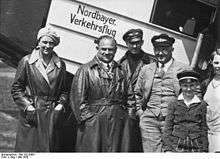Hermann Köhl
| Hermann Köhl | |
|---|---|
.jpg) | |
| Born |
15 April 1888 Neu-Ulm, Bavaria |
| Died |
7 October 1938 (aged 50) Munich, Germany |
| Resting place | Pfaffenhofen an der Roth, Bavaria |
| Nationality |
|
| Occupation | Aviator |
| Known for | First transatlantic flight from East to West, April 1928 |

Hermann Köhl (15 April 1888 – 7 October 1938) was a German aviation pioneer and pilot of the first transatlantic flight from East to West.
Biography
Köhl was born in Neu-Ulm, Bavaria, as one of eight children. At the age of 19 he joined the German Imperial Army to become an officer like his father. At the beginning of World War I he was a Lieutenant in the Württembergisches Pionier-Bataillon Nr.13 ("13th Württemberg Pioneer Battalion"). After being wounded in the legs, which disqualified him for further service in the engineers, he volunteered to join the German Army Air Service. He became a pilot and later a commander of a Bomber Squadron, and received the Pour le Mérite in 1918. He crashed his aircraft behind enemy lines and was captured and held as a POW in France, but managed to escape and returned to Germany.
After the end of World War I he worked for the German Police and for the Reichswehr, but in 1925 he transferred to civil aviation and became the head of the Deutsche Luft Hansa Nightflight Branch in 1926.
Transatlantic flight

After Charles Lindbergh crossed the Atlantic from West to East in May 1927, the idea of flying in the opposite direction, which is more difficult because of the prevailing winds, became more and more popular. In 1927 Ehrenfried Günther Freiherr von Hünefeld bought two Junkers W 33 aircraft from the Junkers company in Dessau, naming them after the two Norddeutscher Lloyd flagships SS Bremen and SS Europa. His plans were supported by Hugo Junkers. After some test flights, and breaking the record for flight duration, Hünefeld and Köhl flew to Baldonnel, Ireland, where they met James C. Fitzmaurice, the Irish Air Corps Commandant of the Baldonnel Airodrome. On 12 April 1928 these three left Baldonnel in the Bremen and crossed the Atlantic Ocean, landing at Greenly Island on the south coast of Labrador, Canada. Even though they missed their intended destination, New York, they were the first to cross the Atlantic from Europe to America.
For his feat, Köhl was awarded the Distinguished Flying Cross by Calvin Coolidge, the President of the United States.[1]
In 1935 William L. Shirer took Köhl's apartment in Tempelhof, after he had lost his job with Luft Hansa; as a fervent Catholic and a man of strong character, Köhl then retired a small farm in the south of Germany rather than curry favour with the Nazis.[2]
Köhl died in Munich in 1938 and is buried in Pfaffenhofen an der Roth.
Tributes
A German Luftwaffe Airbus A310 MRTT medevac aircraft, and the Bundeswehr barracks of the Transporthubschrauber-Regiment 30 in Niederstetten are named after Hermann Köhl. There is also a street in Bremen, near the airport, which was named after him.
References
- ↑ "Valor Awards for Hermann Koel". Military Times Hall of Valor. Retrieved 28 November 2011.
- ↑ Shirer, William L. (1941). Berlin Diary. Alfred A. Knopf. Entry for 3 June 1935.
Literature
| Wikimedia Commons has media related to Hermann Köhl. |
- Köhl, Hermann (1928). The Three Musketeers Of The Air. Putnam.
- Hofbauer, Michael; Leder, Dieter; Schmelzle, Peter (2003). Die Welt der Überflieger – 75 Jahre Nordatllantikflug Ost-West. Deutsche Post AG.
- Hotson, Fred W. Die Bremen. NARA-Verlag. ISBN 3-925671-22-6.
- Blendermann, Karl-August. Atlantikflug D 1167. Verlag Hauschild. ISBN 3-929902-71-0.
| ||||||||||||||||||
|